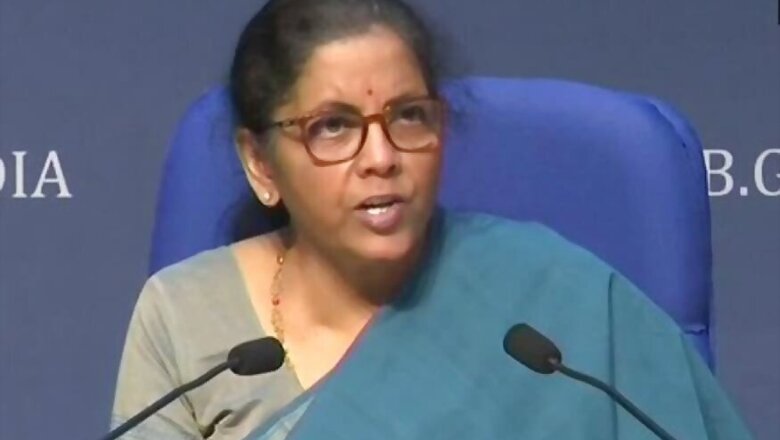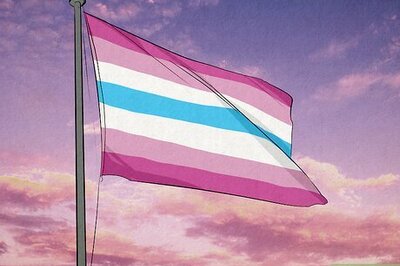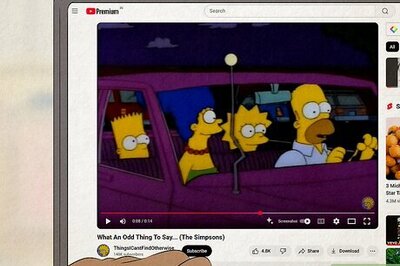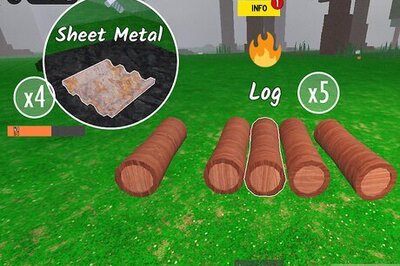
views
While announcing the fifth and final tranche of Rs 20 lakh crore economic package to help reviving economy that was hammered due to coronavirus pandemic, Union Finance Minister Nirmala Sitharaman also talked about reforming education sector amid the Covid-19 lockdown. In a bid to help students in both urban and rural areas who do not have access to internet, the government today announced that direct telecast mode use by schools will now get 12 additional channels. She asserted that technology has been used in a big way to continue education and enhance learning.
Tune into classes on channel
Sitharaman said that already DTH channels are earmarked to this but now “another 12 channels are being added to it.” “I am sure in schools in rural areas, it will be of great help. Schools can bring in technology and children love technology so they will adapt to it. There will be provision to telecast live interaction session. These channels can bring experts from home through Skype. We have tied up with private DTH - Tata Sky and Airtel - to air educational video content to enhance learning interest of children,” Sitharaman said today.
Union Minister of Human Resource Development Ramesh Pokhriyal Nishank had earlier said in an interview that to address the digital divide, the ministry has collaborated with Ministry of Information and Broadcasting to air SWAYAM PRABHA channels on the DTH platforms, as it would bring accessibility to a student sitting anywhere across India.
The minister explained that the channels can be accessed just by asking the DTH service provider and it would not incur any extra cost as these are free to air channels so that the students could continue the education even in the lockdown.
The HRD ministry was also exploring to other options like - All India Radio, Doordarshan and 2G network - to transmit the curriculum to the students.
Stating that the initiative requires coordination among various states of the country, Sitharaman said, “They will be coordinating to share air time - four hours is given every day. SWAYAM PRABHA is telecasting educational content, while 200 new textbooks are being added to e-pathshala.”
E-Pathshala, which is available in many languages, enables access to various e-books and related learning materials. The central government has undertaken efforts such as the DIKSHA Portal, to help teachers and boost e-learning. While SWAYAM PRABHA, aimed at improving access, equity and quality of education.
Tech driven education with equity post Covid-19
The Finance Minister announced tech driven education with equity post Covid-19 which includes, “PM e-Vidya: A program for multi-mode access to digital education consisting of one earmarked TV channel per class from class 1 to class 12.”
There will be DIKSHA program for school education in states and union territories, e-content and QR coded textbooks for all grades in schools. The government is encouraging extensive use of radio, community radio and podcasts.
The announcement factored in the mental health of students who have been in lockdown for 54 days. The government has started Manodarpan, an initiative for psychological support of students, teachers and families for mental health and emotional well-being.
Online classes for higher education
For higher education, Sitharaman informed that top 100 universities will be permitted to automatically start online courses by May 30. The announcement on online education came when there is growing anxiety and mistrust in the medium to reach all.
The teachers in various universities held a joint meeting with leaders of students' and teachers' organisations for a meeting on the matter pertaining to online exam.
“The recent experiences of online teaching have only confirmed our understanding that these are not solutions for inclusive education. Teachers have engaged with students through e-resources in the lockdown period but because of lack of resources and institutional help and suddenness and newness of the form of teaching, the experiences show that very few students are actually able to attend classes,” said Delhi University Teachers Association in a statement signed by Rajib Ray, President and Rajinder Singh, Secretary, yesterday.
The experiences (of both students and teachers) and surveys conducted by several students' groups and by some universities have shown that the penetration of such a mode of education is extremely limited, it is discriminatory and exclusive in nature.
“For a large University like ours, which caters to diverse student population, the online education and examinations only stands to exclude many more,” said DUTA. It has submitted a detailed response to the Vice Chancellor on the matter on May 14 and similarly, students have also sent in their representations.

















Comments
0 comment